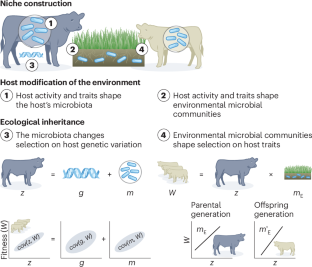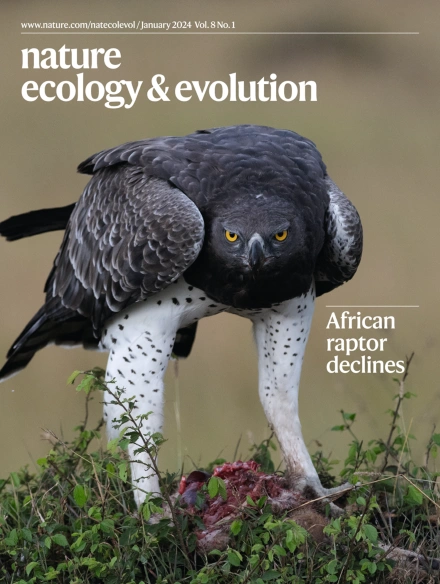应用进化论来理解宿主-微生物群的进化
IF 13.9
1区 生物学
Q1 ECOLOGY
引用次数: 0
摘要
所有的植物和动物都是一个微生物群落的宿主,它们的微生物群对宿主的生活史和生产性能有着至关重要的影响。尽管这种宿主-微生物群关系很重要,但相对而言,人们对微生物群在宿主和整个宿主-微生物组合的进化中所起的作用知之甚少。这种知识差距部分是由于缺乏对宿主-微生物群系统的进化动力学产生可测试预测的理论框架。从这个角度来看,我们认为这种框架的基础存在于进化理论中。我们强调了四个理论模型的例子-生态位构建,间接遗传效应,母体效应和多层次选择-捕捉宿主-微生物组进化的重要方面。我们概述了这些框架如何为宿主-微生物群系统的进化提供关键见解,同时也建议扩展当前的理论,以纳入宿主-微生物组合的独特过程;例如,关注微生物群传播和生态微生物群落动态的细微差别。扩展进化理论以适应宿主-微生物群的关联是更全面理解进化的关键,本文概述的方法可以指导未来对这些无处不在的相互作用的功能和进化进行实证研究。本文章由计算机程序翻译,如有差异,请以英文原文为准。


Applying evolutionary theory to understand host–microbiome evolution
All plants and animals are host to a community of microorganisms, their microbiotas, which have crucial influences on the life history and performance of their hosts. Despite the importance of such host–microbiota relationships, relatively little is known about the role microbiotas have in mediating evolution of the host and entire host–microbe assemblages. This knowledge gap is partly due to the lack of theoretical frameworks that generate testable predictions on the evolutionary dynamics of host–microbiota systems. In this Perspective, we argue that the foundation for such frameworks exists in evolutionary theory. We highlight four examples of theoretical models—niche construction, indirect genetic effects, maternal effects and multilevel selection—that capture important aspects of host–microbiome evolution. We outline how each of these frameworks can provide key insights into the evolution of host–microbiota systems while also suggesting expansions of current theory to incorporate processes unique to host–microbe assemblages; for instance, focusing on nuances in microbiota transmission and ecological microbial community dynamics. Expanding evolutionary theory to accommodate host–microbiota associations is key for a more integrative understanding of evolution, and the approach outlined here can guide future empirical research on the function and evolution of these ubiquitous interactions. This Perspective discusses how well-established theoretical models of evolution can be adapted to study and generate testable predictions about the evolutionary dynamics of host–microbiota associations.
求助全文
通过发布文献求助,成功后即可免费获取论文全文。
去求助
来源期刊

Nature ecology & evolution
Agricultural and Biological Sciences-Ecology, Evolution, Behavior and Systematics
CiteScore
22.20
自引率
2.40%
发文量
282
期刊介绍:
Nature Ecology & Evolution is interested in the full spectrum of ecological and evolutionary biology, encompassing approaches at the molecular, organismal, population, community and ecosystem levels, as well as relevant parts of the social sciences. Nature Ecology & Evolution provides a place where all researchers and policymakers interested in all aspects of life's diversity can come together to learn about the most accomplished and significant advances in the field and to discuss topical issues. An online-only monthly journal, our broad scope ensures that the research published reaches the widest possible audience of scientists.
 求助内容:
求助内容: 应助结果提醒方式:
应助结果提醒方式:


